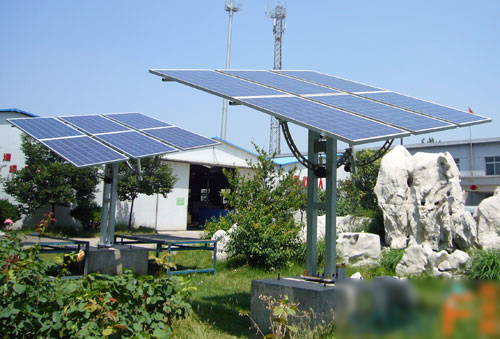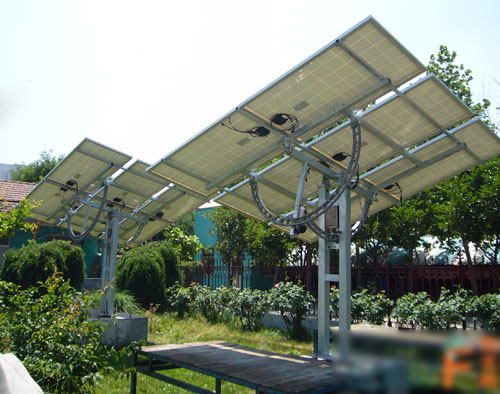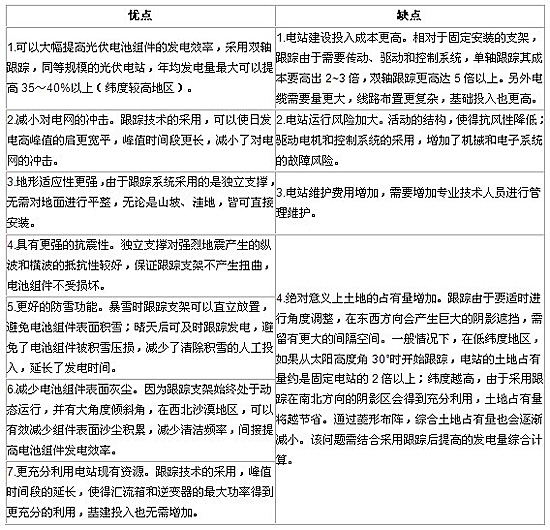Due to the influence of the rotation and revolution of the earth, for a certain fixed location on Earth, the sun, the sun, the sun, the sun, and the sun will change every day. In photovoltaic applications, if the light of the sun is always kept perpendicular to the battery components, the refraction loss of light can be reduced, and the power generation efficiency of photovoltaic modules can be greatly increased to maximize the use of solar energy. Photovoltaic power automatic tracking system can keep the photovoltaic panels facing the sun at any time, so that the sunlight's light can be vertically irradiated to the photovoltaic panels at any time, greatly increasing the power generation of photovoltaic modules and reducing the investment cost of photovoltaic power generation systems. At a time when the price of photovoltaic modules is high, the photovoltaic tracking system accounts for a relatively small proportion of the investment in the power station. Naturally, it pays a lot of attention to a product with little investment and a substantial benefit. Each PV development pioneer and major installed country such as Germany, Spain, Italy, and the United States have successively created a number of professional manufacturers of production tracking systems, and introduced various forms of tracking systems; there are also dozens of companies in China that are developing and producing different forms of Tracking systems, and products of varying sizes were adopted. In recent years, with the sharp dive of PV module prices, the proportion of tracking system costs to PV installation costs has increased significantly, making automatic tracking systems with a relatively high initial investment amount gradually deterred. Technological innovation drastically reduces tracking costs It is understood that the average installed cost of domestic PV systems is less than RMB 10/watt, and the cost of most dual-axis tracking systems currently on the market is more than RMB 4/watt, even if the cost of fixing brackets is deducted from RMB 0.5 to RMB 0.7/watt. Its tracking cost accounted for 30% to 35% of the installed cost of the system. In addition, the tracking system also needs to bear the risk of device operation, avoid shadows and occupy more land costs, etc. Therefore, even if the 30% to 40% increase in power generation, tracking has no economic significance. However, this situation is expected to be completely changed by a completely new technology: The new technology adopts a structural model with completely independent intellectual property rights, and connects a photovoltaic cell module holder and a support frame together with a cross-shaped rotating shaft. The vertical angle rotation drive system and the corner drive system are perpendicular to each other. Relying on the cross-shaped rotation axis, a coordinate system corresponding to the celestial sphere is established. Through the change of the coordinate point, the sun's trajectory curve is actively copied to realize the sunlight. Accurate correspondence. The structure greatly simplifies the drive and transmission structure of the dual-axis tracking system, and the control program is also simpler, so that the cost of accurate dual-axis tracking can be achieved at RMB 2/watt under large-scale application. At present, the company that masters this core technology is Shandong Chaori Photovoltaic Technology Co., Ltd. Comparison of advantages and disadvantages of dual axis tracking Any kind of tracking system will inevitably have its advantages and disadvantages. Photovoltaic power plant is a complex system engineering. Under the premise of low cost and high output, operators must consider the impact of tracking system usage on other things. The basic advantages and disadvantages of photovoltaic tracking technology are described in the following table: Photovoltaic tracking technology advantages and disadvantages In fact, in terms of land use, it should be considered comprehensively. Since the tracking system has no fixed cover on the ground, there is no fixed shadows during operation, and it is independently supported, it can be installed in farms, gardens, and pastures, without hindering plant growth. Instead, it can make fuller use of land resources. In addition, tracking systems can also produce more energy-efficient and environmentally-friendly integrated social effects: The increase in the photoelectric conversion efficiency of battery modules reduces the use of battery modules in power plants of the same scale and indirectly avoids high energy consumption in the production of battery modules. High pollution. Compared with similar products in the industry, the new tracking system has the following advantages in addition to its obvious cost advantages: 1. High tracking accuracy: <0.25° (minimum control range 0.1°). 2. Less energy consumption: The motor running power is only 3 watts, and the daily tracking power consumption is less than 0.01 watts (measured value), and the tracking power consumption per kilowatt component is less than 1 degree per year. 3. The warranty period is extended to 20 years: very few consumable parts have laid a solid foundation for providing a longer warranty period. 4. Wide range of applications: horizontal angle>270°, pitch angle>120°. 5. The control program is simple: full clock control, more stable operation. 6. Transportation, installation and construction are convenient: no large-scale transportation and construction machinery are required, and it is more suitable for complex terrain such as roofs and slopes. The requirements for the construction site are lower, installation and debugging are easier, and two people can complete independently without the help of machinery. 7. The wind resistance is good: the cost is reduced, making Asahi Photovoltaic Tracking System smaller in size and low in wind resistance. (The current market's tracking system is very large in size, its main purpose is only one, that is, low cost drive and control, other advantages) 8. The overall structure is reasonable: the weight of the battery module and its fixing frame completely falls on the cross-shaped rotating shaft, and is entirely borne by the supporting frame, which greatly reduces the load on the driving system. 9. Maintenance and maintenance are easy: smaller monomer specifications, low structure, easy to clean and repair the battery board surface. China has a vast territory and a complex and diverse climatic conditions. Two-axis tracking is used in different regions, and the proportion of increase in power generation is quite different. In general, the higher the latitude, the better the lighting condition and the greater the increase: In most regions within 25° north latitude, the power generation is increased by less than 30%; while in the northwest, the light conditions in the northwest are 35 to 40° and above. In the region, the power generation can be increased by 35% to 40%.
Abrasive Paper is generally used for wood grinding and automobile industry grinding. When it comes to use, it can be used for both hand use and machine use. According to the abrasive, it can be divided into Aluminum Oxide Abrasive Paper and Silicon Carbide Abrasive Paper. Some of them can be used for Waterproof Abrasive Paper. The sand paper can be shaped into abrasive roll or abrasive sheet. It can be available in different grit.
If you have any questions, please contact with us directly. The Abrasive Cloth are produced with high quality and good appearance. Welcome you can visit our factory for inquiry. Please send mail directly to us.
Advantages of Aluminum Oxide Abrasive Paper:
High quality and low price
Available in vary grit
Abrasive Paper Abrasive Paper,Dry Abrasive Paper,Waterproof Abrasive Paper,Dry Emery Cloth Jiangsu Fengmang Compound Material Science & Tech Group CO.,LTD , http://www.fmabrasive.com



Photovoltaic power generation automatic tracking system greatly increases power station profit